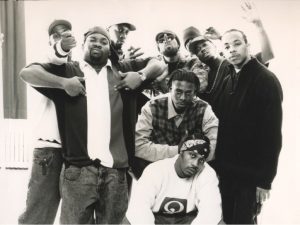Wu-Tang 25: Quarter Century of Shaolin is a year-long series celebrating the 25th Anniversary of the Wu-Tang Clan’s Enter The Wu-Tang (36 Chambers).
So, what’s next?
Going forward, what, possibly, is in store for the Wu?
For one, a full-fledged Wu-Tang Clan album. I’ve harped on the fact that U-God wasn’t on The Saga Continues, and I do hope that if there is another group album that his voice be a part of it as well. It’s important for a few reasons. Hip-hop as a genre is still young, so there are still milestones that the culture has to reach. One of those milestones is having a hip-hop crew be canonized. Of course, the Wu-Tang Clan have been deemed important and will forever be a cornerstone. I look at other genres, and I see how active, and how their legacy bands are still involved. Led Zeppelin, or The Who, for example are still together and actively touring. The Wu can be our first rap group or crew to achieve that. Yes, they have their solo careers and do shows with one another, but the idea of the Wu doing an official tour excites me. Unfortunately, ODB won’t be able to join (they can bring out the hologram again), but for a tour like that to happen, a new album with the entire crew is necessary.
That potential of a tour is important for another reason. We need to show them we appreciate them while they are with us. This fact really came into focus for me this year, when Mac Miller passed away at 26 years old. Of course they know we love them and appreciate how they meaningful they have made our lives, but that shouldn’t stop us from continuing to tell them we love them. It’s human to wonder what impact we have on each other, and to the world. Even when they already know, why should we stop showing them? Let’s celebrate them while we still have them.
That’s why I decided to take it upon myself to spend a whole year on the Wu. Not only to celebrate 36 Chambers, not only to revisit one of the most influential forces in my life, but also to say thanks.
When I began taking hip-hop seriously and becoming a student of it, Wu-Tang was the first rap act I cut my teeth on. They energized me to analyze lyrics, listen to the beats, and encouraged me to examine the context of hip-hop and why the culture has not only remained relevant, but understand why it’s now one of the biggest influences in the world today. Frankly, I don’t know if I would be writing at Selective Hearing (or at all) if it wasn’t for the Wu.
On behalf of myself and everyone else that has uttered Wu-Tang proudly, I say thank you.


















